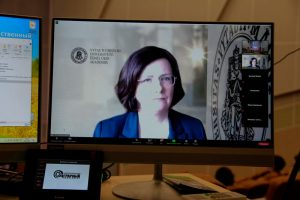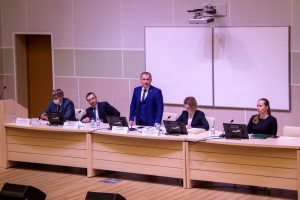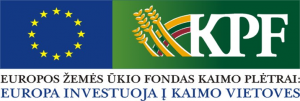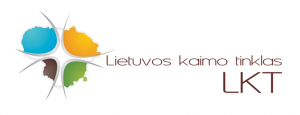VMU Signed Memorandums of Understanding With Two UK Universities
In a ceremony at the British Embassy in Vilnius on 14 June, Vytautas Magnus University (VMU) signed memorandums of understanding with two universities of the United Kingdom: the Royal Agricultural University (RAU) and the University of Strathclyde. This partnership allows students to acquire a combination of British and Lithuanian education which will raise their competences and professionalism to an international level.
“The partnership with RAU is unique and promising: it will unite the two main academic institutions of both countries that conduct scientific research and studies in the fields of agriculture, forestry, and bioeconomics. It is my belief that joint efforts will improve our contribution to the implementation of the global Green New Deal”, VMU Rector Prof. Juozas Augutis said.
VMU will cooperate with the University of Strathclyde in the implementation of master’s degree studies. The universities are currently preparing the Education Management programme, while the future plans are dedicated to the development of research projects and employee exchange. According to VMU Rector, the partnership with the University of Strathclyde is an important step in the promotion of international training of teachers in Lithuania. Importantly, the partnerships will allow students to have even more experiences and opportunities: new double-degree programmes will be developed, and their graduates will receive double diplomas.
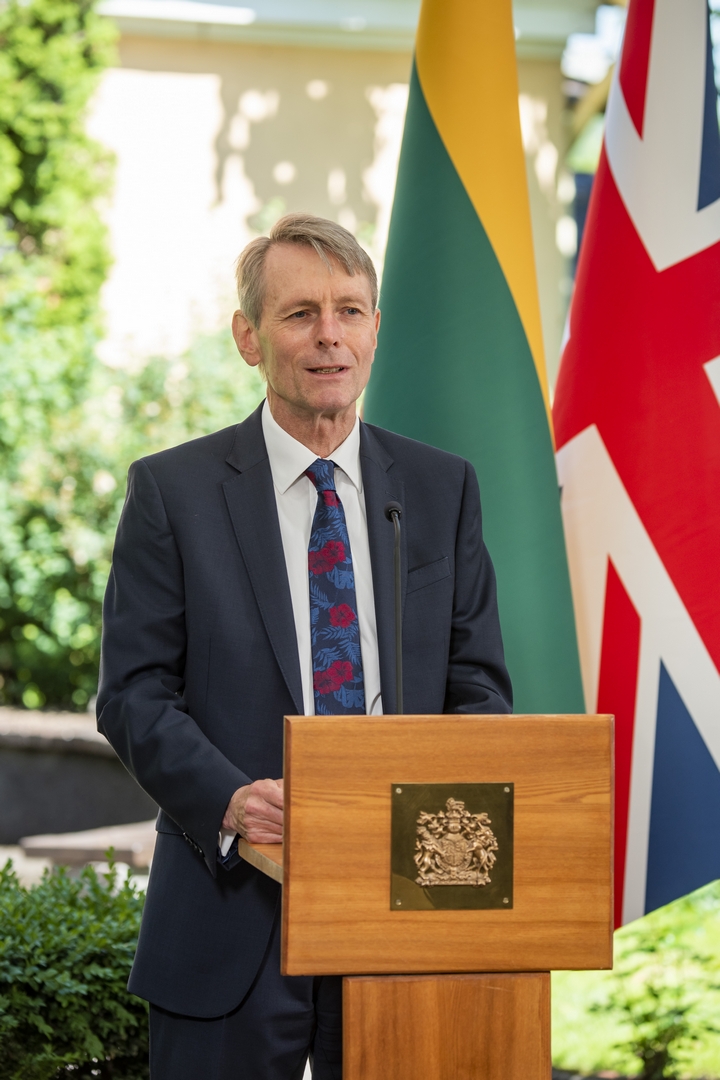
Speaking at the start of the ceremony, the British Ambassador to the Republic of Lithuania John Brian Olley noted that one of the most rewarding privileges of diplomatic service is to be able to celebrate real progress in building even stronger relations between two countries. According to the ambassador, the United Kingdom value collaboration with Lithuania through overseas higher education programs, joint research programs, publications, student and staff mobility exchanges.
“I congratulate all three universities at the start of this new key strategic partnership. These new partnerships will enable a higher level of academic and scientific cooperation between our two countries, especially on the Green Agenda and in education. This will also widen opportunities for the mobility of students and members of academic staff”, the ambassador emphasised.
The event’s participants also included the Vice-Minister for Education, Science and Sports of the Republic of Lithuania Gintautas Jakštas. The vice-minister noted that such European higher education cooperation initiatives significantly increase mobility and enhance the quality of education and research. Also, they enable students to obtain a degree by studying in several different countries. “We believe that shared experience and different approaches, the pooled competences through the partnership established today will [not only] give an impulse to the new quality of academic cooperation, but also it will contribute to the efficient solutions of global green challenges. My congratulations and sincere wish for sustainable and fruitful cooperation”, Gintautas Jakštas said.

Before signing the memorandum with VMU, the Vice-Chancellor of RAU Prof. Joanna Price highlighted that the new agreement is a continuation of traditions for the university, which was opened 175 years ago: for many decades, the Royal Agricultural University has had an international outlook and collaborated with the best in the field to ensure the advancement of agricultural productivity and global as well as national food security.
“This exciting new collaboration with VMU is an important extension of this transition, bringing together two leading agricultural specialists in the shared endeavour of addressing food security in the context of profound climate and environmental change. I sincerely hope that our new collaboration with VMU will enable both our respective researchers and students to play an important and innovative role in making the most of the new opportunities and leading the way towards a more equitable and healthy world”, the Vice-Chancellor said.
Concurring with Prof. Joanna Price, the RAU Pro-Vice Chancellor Prof. Neil Ravenscroft added that one of the main goals of cooperation with VMU is to provide students and staff with the opportunity to have international experience to understand problems from different perspectives. “Working collaboratively offers so much more than working in isolation. And it’s been cornerstone of the RAU as a specialist provider in the UK to find the right partners globally to work collaboratively”, Prof. Ravenscroft noted.

The other memorandum of understanding was signed between VMU and the University of Strathclyde. The Associate Principal and Executive Dean of the Faculty of Humanities and Social Sciences at UoS, Prof. Ian Rivers, reminded the audience that this university was founded in 1796, and today its aim is to meet the needs of the 21st century student and the demands placed upon them.
“Partnership is at the heart of our commitment to useful learning, and I hope that this new relationship with VMU will enhance that commitment. I’m very pleased that we can build even stronger connections to Europe and more especially with Lithuania, through the development of our own academic partnership in the field of educational management and leadership. The development of a joint degree is one of our international priorities”, Prof. Rivers said, adding that the new joint Educational Management and Leadership programme is expected to be ready in 2022.
Other representatives of the University of Strathclyde also spoke during the ceremony. Joanna Holmes, the Associate Dean, Director of Professional and Academic Learning at the School of Education of the University of Strathclyde, noted that it was exciting and pleasing to see something that began as conversations on Zoom come to fruition in this way. Mark Wilber, the Business Development Manager, expressed hope that University of Strathclyde will soon be able to welcome VMU employees and students.
VMU Vice-Rector for Communication Assoc. Prof. Vilma Bijeikienė remarked that the university considers these two memorandums to be an encouragement and strong obligation to strive for better quality in studies and research. “The legendary basketball genius Michael Jordan said: “Talent wins games, but teamwork and intelligence win championships”. I hope that this cooperation will allow the teams of our scholars of our universities ultimately to make our youth and our countries the winners”, VMU Vice-Rector said at the end of the ceremony.







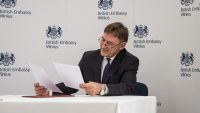

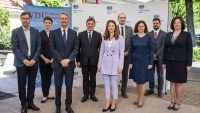

The first of its kind Digital Sea hackathon in Lithuania
The three EIT FOOD hubs of the Baltic States — AgriFood Lithuania DIH, Riga Technical University and Tartu Biotechnology Park — are coming together for the first time ever for the exceptional international online hackathon HACK DigitalSea’21, which was initiated by the Lithuanian Digital Innovation Hub.
The organisers are inviting both students, who are still seeking ideas, and experienced start-ups to compete in a variety of categories for winnings from a 12,000-euro prize fund. Registration for the hackathon has already begun and will be open until June 27. HACK DigitalSea’21 will be held on July 3-4.
Hackathon supported by the Ministries of the Environment of the Baltic States
The relevance of the topic is confirmed by the great attention paid to the hackathon by the authorities of the Baltic States. The Ministries of the Environment of all three Baltic States as well as the Ministry of Energy of the Republic of Lithuania have already became official partners of the event.
“Digital and innovative solutions that promote the development of green ports, reduce pollution and the impact of shipping, preserve natural biodiversity, strengthen food value chains, promote the use of renewable energy sources, make more efficient use of logistics and involve society in these processes are especially important to us. Innovative solutions developed by young innovators during the hackathon would allow us to become even more competitive as it would make us greener and more sustainable. This would not only allow us to protect nature and human health, but also give us a possibility to compete successfully with other EU countries,” says the Minister of the Environment of the Republic of Lithuania Simonas Gentvilas, who actively supports the idea of the HACK DigitalSea’21. Together with the Ministers of the Environment from Latvia and Estonia, Simonas Gentvilas will give a welcome speech during the opening of the hackathon.
Three prize categories of the hackathon
An experienced international jury will select winners of the HACK DigitalSea’21 hackathon in 3 different categories: The Most Advanced Solution, The Strongest Idea and From Zero to Hero. The winners will be awarded cash prizes of 4,000 euros. Participating teams will also be competing for other valuable prizes established by the partners of the event.
“This time we took into account the fact that not all teams compete under equal conditions for a variety of reasons. Some teams are simply too strong and makes it impossible for beginner teams to win. Others come to the hackathon with already existing solutions. These teams are particularly difficult to compete with for those who begin creating a response to a challenge only during the hackathon. Now everybody will have an equal chance to win,” says the director of the AgriFood Lithuania DIH Kristina Šermukšnytė-Alešiūnienė.
Four challenge categories
According to the organizers of the event, this hackathon is a great opportunity to identify and start solving problems existing in the sea. The sea in this context is not only ships and ports. It is also a very important part of a sustainable environmental ecosystem, food supply chains, logistics and renewable energy. The European Commission has set the goal to scale up renewable energy quantities 5 times by 2030 and 25 times by 2050. The Baltic Sea itself is rated fourth worst-polluted in the world as it is severely impacted by chemicals and eutrophication with as many as 2000 ships sailing in its waters at any given moment. Excessive fishing, the use of bottom trawls and fishery farms have already caused great damage to the ecosystem of the sea. Furthermore, a great untapped potential in the Baltic Sea exists as, for example, the biomass produced from macroalgae could be used as food and consumables. However, growing and harvesting macroalgae is still in its infancy in the Baltic Sea.
The participants of the HACK DigitalSea’21 will choose a challenge from four main categories: Precision Fishing and Aquaculture, Environmental Sustainability, Advanced Logistics Solutions and Renewable Energy. Specific challenges will be purposed by companies and organizations facing particular issues every day.
The highest performing teams will be able to present their solutions during the high-level Digital Sea Conference. It is the only event in Lithuania and one of the few events in Central and Northern Europe to receive the right to be part of the European Commission’s European Maritime Day initiative.
Do not miss the opportunity to participate in this exceptional international hackathon, offer sustainable and advanced solutions and win cash prizes. Registration has already begun and will be open until June 27!
More information about the organisers of the hackathon
The main organiser of the event is Lithuanian Digital Innovation Hub AgriFood Lithuania DIH. In 2020, it was highlighted as one of two good practice examples of European sectoral DIHs in the overview of the European Commission’s Joint Research Centre. Also, AgriFood Lithuania DIH became an EIT FOOD Hub in Lithuania in March 2021.
EIT FOOD is a leading food innovation initiative in the European Union, which seeks a more sustainable, healthier and more reliable food system across the continent. It is the most prestigious organisation of this type in the EU, which brings together digital innovations hubs across Europe. You can find out more about EIT FOOD by visiting its website.
Other organisers of the hackathon are Riga Technical University and Tartu Biotechnology Park.
VMU Will Hold Graduation Ceremonies
On 21-23 June, Vytautas Magnus University will be holding its graduation ceremonies, bidding farewell to the university’s latest graduates.
On 21 June, diplomas will be awarded to the graduates of the faculties of Economics and Management, Law, and VMU Education Academy (in Kaunas). Additional ceremonies will also be held on the same day for the graduates of VMU Music Academy and Agriculture Academy (faculties of Agricultural Engineering, Agronomy and Forest Sciences and Ecology).
On 22 June, the university will send off alumni of the faculties of Natural Sciences, Informatics, Political Science and Diplomacy, and Catholic Theology. Additional ceremonies will also be held on the same day for the graduates of VMU Agriculture Academy (faculties of Bioeconomy Development and Water and Land Management).
On the final day, ceremonies will be dedicated to the graduates of the faculties of Social Sciences, Arts, the Humanities and VMU Education Academy in Vilnius.
Regrettably, the celebration will not be open to everyone, the way it was before. Taking into account the quarantine situation declared in the entire country due to the threat of the spread of COVID-19, to ensure the safety of the university’s community and their relatives, this year VMU graduate ceremonies will be a bit different than usual.
Vytautas Magnus University’s diplomas will be awarded to the graduates in VMU spaces. However, relatives and friends will be able to congratulate and take pictures with the new alumni outside. They will be able to watch the diploma award ceremony itself live at vdu.lt/graduation on their smartphones and other devices.
Due to the strict requirements of the appropriate disinfection and preparation of academic dress (gowns) for their continued safe use, we will not be able to provide them for all VMU graduates. Therefore, it has been decided that gowns will be worn only by the university’s bachelor’s degree graduates, who will celebrate their first-ever academic graduation ceremony.
We encourage all graduates to bring personal protective equipment. All participants of the graduation ceremony are required to wear medical masks or respirators.
We hope to see you soon at this milestone event, where everyone is filled with joy and a sense of pride after successfully completing an important stage of their lives.
Nevertheless, the graduates who are unable to attend the graduation ceremony will be able to receive their diploma at their faculty (in five workdays after the ceremony), or at the Department of Studies (after this time period ends).
Monday 21 June
VMU GREAT HALL | S. DAUKANTO G. 28, KAUNAS
9:30 a.m. Graduation ceremony of the Faculty of Economics and Management (BA)
12 p.m. Graduation ceremony of the Faculty of Economics and Management (MA)
2:30 p.m. Graduation ceremony of VMU Education Academy in Kaunas
4:30 p.m. Graduation ceremony of the Faculty of Law
VMU MUSIC ACADEMY | V. ČEPINSKIO G. 5, KAUNAS
11 a.m. Graduation ceremony of Music Academy
FESTIVE HALL OF VMU AGRICULTURE ACADEMY | STUDENTŲ G. 11, AKADEMIJA, KAUNO R.
9:30 a.m. Graduation ceremony of the AA Faculty of Agricultural Engineering
11:30 p.m. Graduation ceremony of the AA Faculty of Agronomy (BA of Agronomy and MA of Agronomy)
2 p.m. Graduation ceremony of the AA Faculty of Forest Sciences and Ecology
4:30 p.m. Graduation ceremony of the AA Faculty of Agronomy
- BA: Management of Biological Systems, Landscape Design, Quality and Safety of Food
- MA: Quality and Safety of Food Plant Raw Materials
Thursday 22 June
VMU GREAT HALL | S. DAUKANTO G. 28, KAUNAS
9:30 a.m. Graduation ceremony of the Faculty of Natural Sciences
12 p.m. Graduation ceremony of the Faculty of Informatics
2:30 p.m. Graduation ceremony of the Faculty of Politics and Diplomacy
VMU AULA MAGNA | GIMNAZIJOS G. 7, KAUNAS
12 p.m. Graduation ceremony of the Faculty of Catholic Theology
FESTIVE HALL OF VMU AGRICULTURE ACADEMY | STUDENTŲ G. 11, AKADEMIJA, KAUNO R.
11:30 p.m. Graduation ceremony of the AA Faculty of Water and Land Management
2 p.m. Graduation ceremony of the AA Faculty of Bioeconomy Development
Wednesday 23 June
VMU GREAT HALL | S. DAUKANTO G. 28, KAUNAS
9:30 a.m. Graduation ceremony of the Faculty of Social Sciences
12 p.m. Graduation ceremony of the Faculty of Arts
2:30 a.m. Graduation ceremony of the Faculty of Humanities
- BA: Cultures and Languages of East Asian Countries, Cultures and Languages of Scandinavian Countries, History, Philosophy
- MA: Comparative Cultural Studies, East Asia Region Studies, East-Central European and Lithuanian Historical Studies, Practical Philosophy
4:30 p.m. Graduation ceremony of the Faculty of Humanities
- BA: English Philology, English and German Philology, Italian Studies and Romance Languages, Language and Culture of Francophone Countries, Lithuanian Philology and Publishing, German language and communication
- MA: Applied English Linguistics, Literature and Press, Modern Linguistics, Sociolinguistics and Multilingualism
VMU EDUCATION ACADEMY | T. ŠEVČENKOS G. 31, VILNIUS
10 a.m. Graduation ceremony of VMU Education Academy in Vilnius
- BA: English philology and another language, English philology, Pedagogy of geography and history, Early Childhood and Pre-primary Education, History and Ethics Pedagogy, Career Management, Polish philology, Lithuanian philology, Music Pedagogy, Primary Education, Education and Information Technologies.
- MA: Inclusive Education: Socio-Educational Industries
12:30 p.m. Graduation ceremony of VMU Education Academy in Vilnius
- Pedagogy of Physical Culture (BA), Psychology (BA), Social Pedagogy, (BA) Pedagogy (vocational studies), and part-time studies of the winter session)
Online Summer University 2021
Online Summer University 2021 with the title “Europe and the (Post) COVID-19 World” taking place at the Institute of International Studies, Charles University Prague, Czech Republic. This online course will be launched from September 13 to September 17, 2021.
The Online Summer University 2021 organised by the Institute of International Studies of Charles University Prague will provide students with a broad understanding of the most significant impacts of the COVID-19 pandemic on international relations and Europe. The key objective is to analyse how Europe’s prospects are currently being shaped in a time of profound global socio-political change, and the context for a future post-coronavirus restart. During the course, students will improve their research, communication, and argumentation skills and learn how to use them in the online environment. The online course’s interdisciplinary approach combines teaching methods such as:
- live online lectures
- group discussions and projects
- individual assignments
- independent research
This study programme is internationally acknowledged. Successful participants will be given 2 or 4 ECTS credits, depending on their work extent. For detailed information, please see the attached flyer
The application deadline is August 29, 2021. Earlier applications have better chances of admission.
International conference “Priorities of Development of the Agro-Industrial Complex in the Conditions of Digitization and Structural Changes of National Economy”
On May 26-28, 2021 an international conference “Priorities of Development of the Agro-Industrial Complex in the Conditions of Digitization and Structural Changes of National Economy” was held at the St. Petersburg State Agrarian University (Russia). The conference was dedicated to the Year of Science and Technology. The conference was opened by Vitaly Morozov, Rector of St. Petersburg State Agrarian University. At the plenary session of this conference, the Chancellor of Vytautas Magnus University Agriculture Academy prof. dr. Astrida Miceikienė made a presentation “An Assessment of the Factors Affecting Environmental Pollution in Agriculture in EU Countries”. The other presenters of the plenary session were veterinary, plant protection, agricultural and forestry specialists from Russia, China and Austria. Further discussions took place in sections in live and remote formats.
Enriched products are the food of the future
Researchers at the Vytautas Magnus University Agriculture Academy, conducting research, have found that corn chips enriched with tomato or beet flour acquire much more health-promoting properties, and oatmeal cookies enriched with cranberry seeds are a source of protein, high in unsaturated fats and fiber.
“Tomato flour contains significant amounts of lycopene and β-carotene. Our aim was to find out whether the combination of this product with other ingredients will also have health-promoting properties,” says Dr. Elvyra Jarienė, Professor of the Faculty of Agronomy of the Vytautas Magnus University Agriculture Academy.
The research team decided to enrich corn chips with tomato flour, in which neither lycopene nor β-carotene is normally detected.
“And we got great results,” says E. Jarienė. “The main value of tomatoes is that they contain a special carotenoid – lycopene. It is a unique natural remedy for many diseases, and especially for prostate, lung and stomach cancer”.
A significant concentration of bioactive pigments betalains is found in corn chips flavored with different ingredient – beetroot flour. They have a strong antioxidant effect, which helps protect against free radical damage.
Among the valuable products from which flour, chips or snacks can be made, scientists have classified various types of pumpkin and Jerusalem artichokes. The latter, due to the harvest obtained twice a season and the naturally sweeter taste, should also be of interest to people who see new business opportunities.
After summarizing the results of the research conducted together with the co-authors, Prof. Dr. E. Jarienė and Assoc. Prof. Dr. A. Paulauskienė presented a report on the inclusion of biologically valuable products in family nutrition at the “Forum of the Future of Regions”.
The renewed nutrition pyramid, according to them, pays special attention to water, vegetables, greens, whole grains, legumes. Meanwhile, products of animal origin should account for only 20 per cent of total food consumption per day. Lithuanian, organic, with less salt and no added sugar – these keywords are recommended by scientists when choosing products.
“We conducted the research together with the students of the Vytautas Magnus University Agriculture Academy, and we offered to produce some products for both farmers and business representatives,” says E. Jarienė.
According to her, consumers are already reading labels more carefully, searching for products that are more useful to health, so there is no doubt that the food of the future will be more healthy. Researchers are also taking this into account when looking for new combinations of different products.
VMU hosted an international conference about sustainable development of bioeconomy
On May 20-21, the second online conference Sustainable Bioeconomy Development 2021: Adaptation to Climate Change took place in Vytautas Magnus University (VMU). The event was organised by the Faculty of Bioeconomy Development of VMU Agriculture Academy in cooperation with the Faculty of Economics and Social Development of Latvia University of Life Sciences and Technologies. The plenary and panel discussions and seminars welcomed the experts of social sciences from Azerbaijan, Belarus, the Czech Republic, Estonia, Germany, Italy, Latvia, Lithuania, Nigeria, the Netherlands, Norway, Pakistan, Poland, Russia, and Slovakia.
This diversity of participants once again demonstrates the urgent need to find sustainable solutions for the development of the bioeconomy, so it can better adapt for the response to climate change and the challenges related to it. The conference sought to answer the questions of why it is necessary for everyone who uses the natural resources to be socially responsible, understand the importance of the bioeconomic processes and choose the most sustainable solutions. Moreover, it also raised questions why, in the light of global trends and guidelines, it is always of the utmost importance to consider the local context first, and to look for the ways to improve the conditions in it. One of the most important sponsors of the conference, a representative of the society that sees the importance of the bioeconomic processes and directly experiences their changes – the Lithuanian Rural Network, also significantly contributed to the search for these answers (LRN; Project No. PLKT-KK-20-1-01801-PR001, the measure is financed in accordance with the activity area “Lithuanian Rural Network” of the measure “Technical Assistance” of the Lithuanian Rural Development Program 2014–2020. The project is supported by the European Agricultural Fund for Rural Development and the budget of the Republic of Lithuania).
According to the participants of the conference, in order to properly implement the objectives of the European Union’s Green Course Strategy, this topic is extremely relevant on the local and global levels. The European Union’s goal for 2050 to ensure the climate neutrality can only be achieved through major complex changes of the European society and the economy. An unprecedented 30% of the EU budget is dedicated to combating climate change. Thus, in response to these globally pressing problems, it is essential that these processes are cost-effective, balanced and fair from the social perspective. This highlights the need to share the best practices from around the world and to analyze such topics as policy and public investment in bioeconomy research, consumer and producer behavior in the context of climate change, business and place models for the circular bioeconomy or accelerating the bioeconomy through investment and financial decisions.
When welcoming the participants of the conference, VMU Rector Prof. Dr. Juozas Augutis noted that looking for sustainable ways to use limited resources, it becomes clear that the importance of this conference reaches beyond the academic interests. Prof. Dr. Irina Pilvere, Rector of Latvia University of Life Sciences and Technologies, noted that changes must start from knowledge and cooperation. According to Prof. Dr. Astrida Miceikienė, Chancellor of VMU Agriculture Academy, not only the developers of the bioeconomy and agricultural sectors, but also each of us must contribute to sustainable, resource-efficient solutions, and better understanding how food reaches our table, and what agricultural systems can be the most sustainable, especially in Lithuania, where agriculture plays a major role in the economy.
“Science can use the fact-based knowledge basis to meet the big ambition of the Green Deal in Europe,” claims Dr. Martin C. Th. Scholten, a scientist from Wageningen University & Research, during the plenary presentation about the system of food resistant to the effect of climate change and its importance in the future. The researcher shared insights on the versatility and adaptability of the bioeconomy addressing the challenges of climate change, helping farmers to adapt to the climate change, ways to sustainably increase the agricultural production and income from this sector, reduce greenhouse gas emissions and sustainably use extremely limited resources. Dr. Scholten also pointed out that each of us leaves an ecological footprint, and spoke about the ways to avoid wasting resources and the promotion of recycling and reusing resources. “We have one planet to resource the food production,” reminded Dr. Scholten. According to the scientist, this topic is highly relevant not only globally, but especially in countries like Lithuania, the Netherlands and Latvia, where agriculture makes up an inportant part of the economy.
Dr. Gerald Schwarz, a researcher from Thünen Institute with 15 years of experience in agroecology and rural policy analysis, spoke about the transitions in the field of agroecology. The researcher identified the links between the conventional agriculture and organic farming, initiatives addressing the question how to produce sufficient public goods in agriculture, while supporting the development of private goods that ensure economic and social sustainability on the farm level. He emphasized the importance of increasing agricultural productivity on small family farms that are not overly dependent on the public support, and of replacing inefficient practices with more efficient, agro-ecological ones, ensuring greater involvement of farmers and end-users of these goods in the system, raising their awareness and understanding the food path from farm to fork already at school. The researcher also noted the importance of lifelong learning to ensure the sustainability of the entire agricultural and food system and the preservation of biodiversity, using best agro-ecological practices in different countries, as well as to promote conscious and active involvement of local agriculture and related participants of the system.
During the first day of the conference, the parallel sessions featured comprehensive and in-depth discussions of questions related to the bioeconomy-focused research of various policies, public investment and the financing thereof. In this session, a great part of the presentations addressed the tax policies. Researchers discussed how tax instruments can contribute to the promotion of the bioeconomy, the introduction of CO2 and other taxes related to technological progress, which directly contribute to the mitigation of climate change effects. The discussion dealt with food security issues in African countries, as well as how to find the optimal crop production model by assessing the emissions generated, the condition of the soil and other environmental aspects. Other topics discussed included the case of Latvia and the activities of the support for food producers, as well as the price of certification that promotes the development of organic products and how to insure the smooth course of this process. Participants also discussed the generation of animal waste, shared good practices on how waste generation can be reduced, and how various types of waste can be utilized by changing technological processes and at the same time saving energy resources.
A broad scope of topics discussed during the parallel sessions also covered the areas like the production of renewable energy sources (wind, water, solar power) and the impact of national policies on the changes in energy products, national economic development, regional socio-economic development, and reduction of energy costs. The session also featured introduction on some really interesting projects like the bioeconomy platform dedicated to deepen one’s knowledge in various areas of bioeconomy, and follow important solutions of the local government in terms of the development of green and blue areas. Researchers introduced the best practices and provided insights on how the environmental design should be developed to meet the goals of bioeconomy.
The second day of the conference started with an expert discussion on the initiatives related to the European Green Deal. Researchers from Lithuanian and foreign universities as well as the representatives from Lithuanian and foreign businesses looking for sustainable and innovative solutions shared ideas and analyzed how the fuel, fertilizer and plastics sectors could be (and already are) contributing to tackling climate change in Europe and around the world. Dr. Vincent Eijsink, Professor of the Faculty of Chemistry, Biotechnology and Food Science at the Norwegian University of Life Sciences, introduced his research field of industrial biotechnology and the biofuel as its part, as well as further research prospects in this field. According to the researcher, the current research in Europe has great potential to contribute to sustainable, bio-based solutions and is globally competitive. Ahto Oja, Member of the Board of “Balti Biometaan”, shared his insights about the positive environmental impact of using biomethane as an alternative to conventional fuels and the obstacles to the development of the sector, such as the poor knowledge of the public and policy makers about the benefits of using biomethane. Dr. Audrius Gegeckas, Head of R&D Department at “Bioenergy LT”, presented holistic and sustainable high biotechnology solutions that can ensure high yields and maintain biological soil activity, the importance of plant biostimulants and operational guidelines in line with the goals of the European Commission’s “Farm to Fork” strategy. Dr. Gustaf Forsberg, a representative of the Swedish company “ThermoSeed Global” spoke about innovative and highly efficient and environmentally friendly seed processing technology. Dr. Inga Matijošytė, Senior Researcher and Head of Applied Biocatalysis Sector at the Institute of Biotechnology of Vilnius University Life Sciences Centre presented the trends, future possibilities, benefits and the importance of bioplastics production and the use thereof in the pursuit of sustainable solutions. The session was closed by Dr. Irena Vitkauskienė, Business Development Consultant at “Plastiksė”, who presented the trends of plastic use from the business perspective.
During the second part of the plenary session, Dr. Ants-Hannes Viira, Director of the Institute of Economics and Social Sciences at the Estonian University of Life Sciences, introduced research on the good practice business models for sustainable bioeconomy development in the Baltic Sea Region. This presentation provided a detailed analysis of bioeconomy business models that allow self-assessment of the current situation and opportunities to develop sustainable and innovative bioeconomy business in the context of the circular production.
The last part of the conference, the Friday afternoon session, welcomed the scientists from Poland, Lithuania and Azerbaijan. Their presentations shed light on the currently pressing issues: the impact of corporate social responsibility on employee behavior, as well as the results of research on young people’s motivation to work in the agricultural sector and the social dimension of short food supply chains. Most of the presentations focused on analyzing consumer attitudes in the context of climate change, towards the environment, biodiversity and other ecosystem services and the use of renewable energy sources. It has been observed that the interest of scientists in the economic assessment of the environment in the context of consumer and producer behavior opens up new research opportunities.
In the third section of the conference dealing with the business and place models for the circular economy, participants actively discussed such relevant aspects of the circular bioeconomy as food supply chains, business and science models, climate change, business and science success stories from Lithuania, Latvia, Poland, Slovakia, Nigeria and other countries.
The variety of presentations delivered during the two-day conference and the interdisciplinary discussions of experts from different fields perfectly reveal the potential of the bioeconomy in finding sustainable and environmentally friendly solutions. It has also become an excellent platform for exploring new synergies and cooperation opportunities between business, science, politicians and other stakeholders. The importance of communicating these processes to all groups of the society and their involvement in the ongoing changes, as well as the need for continuity of this dialogue, have also been emphasised as well.
The workshop “Food Systems: My Power in Enhancing Sustainable Consumption” which concluded the conference received a lot of attention from the participants. It included stimulating discussions about the local food, local food chains and responsible consumption. The workshop started with a presentation by Prof. Dr. Vilma Atkočiūnienė on food systems and sustainable consumption in the future, followed by various interactive tasks that connected the theoretical knowledge of participants with their practical skills. When completing the tasks, participants explored the origins of their commonly used food products, calculated the “food miles”, considered their own relationship with the consumption of local products and what can be done by every one of us for the sake of sustainable consumption. The active involvement of foreign participants carrying out the tasks enabled a comprehensive analysis of a variety of questions related to sustainable food consumptions and issues related to it.
Scholarship Competition for the Most Active Students of VMU
Since 2016, Vytautas Magnus University (VMU) in cooperation with UAB “Intermedix Lietuva” has established seven one-time scholarships of 200 EUR which are awarded for the final-year students of the 1st and 2nd cycle of the full-time study form or integrated studies.
Scholarships are offered for students with higher academic achievements (total grades average, except for final semester, must be 9 or higher), with a priority for students with higher grades average, and strong involvement in social and public activities within the university and outside of it.
Students who meet the above criteria and wish to participate in the competition to receive a scholarship, by June 1st,2021, (Tuesday) must submit a completed standardized list of printed or accepted publications and information about other student’s scientific or artistic activities in order to receive a scholarship by sending it to e-mail studentas@vdu.lt and indicating in the email, that it is the application for the final-year scholarship competition for scientific (artistic) activities.
Scholarships will be awarded to the best students in the following fields of studies:
- 1 scholarship – Humanities;
- 1 scholarship – Arts;
- 1 scholarship – Engineering, Technology and Agriculture Sciences;
- 1 scholarship – Educational Sciences;
- 1 scholarship – Mathematics, Informatics, Physical Sciences, Life Sciences.
For more information on study programmes and fields of studies, please visit this link.
The decision regarding the awarding of the scholarships will be made by a commission, which will consist of representatives of Vytautas Magnus University. In the absence of appropriate candidates in a specific field of studies, scholarship may be reallocated to other fields of studies.
„R1 Lietuva“ scholarships will be awarded by the end of the spring semester of the 2021 academic year.
More information:
Contest for Teaching and Training Visits under Erasmus+ programme
Contest for Teaching and Training visits under Erasmus+ Programme in Programme countries (EU/EEA) and Partnership countries (non-EU/EEA) for 2021-2022 autumn semester is open.
Aim of a teaching visit is to read lectures for students of a foreign university and encourage them to come to Vytautas Magnus University for Erasmus+ studies.
The main aim of staff mobility training visits is professional development of university’s academic and non-academic staff through participation in training events (except conferences) and internships (work shadowing, participating in training activities) that take place in foreign institutions (higher education institutions, organisations and enterprises).
Currently open contests:
- Contest for Erasmus+ Teaching visits in Programme Countries;
-
Contest for Teaching visits under Erasmus+ Programme for Partner Countries (non-EU/EEA);
-
Contest for Training visits under Erasmus+ Programme for Partner Countries (non-EU/EEA).
All VMU teachers and employees can apply for mobility visits until 9th of June. More information about selection criteria and application requirements could be found in the description of mentioned contests.
Results of the call will be personally emailed to the participants until 25th of June.
More information available at the International Cooperation Department: erasmus@vdu.lt.
The student survey “Teaching and learning evaluation” is underway
The University has launched the student survey Teaching and learning evaluation in 2021 spring semester. In the end of each semester all the students of bachelor, master, integrated and professional studies are invited to share an opinion about teachers and their own work during the semester study subjects. The survey is anonymous!
In order to enhance the objectivity of evaluation, the survey is open until the 23rd of May, i. e. by the main examination session. Teachers will be able to observe the results related to their courses in the middle of June. This choice was initiated in order to increase the objectivity of the survey results:
- students could present their opinion (which would not have been influenced by the final assessment of the study subject) on teaching and studying more objectively;
- at the end of teaching the study subject and organising the final assessment, the opinion of the students expressed in the survey would not affect the teachers.
The survey is of a general nature, so teachers can respond to students’ suggestions in preparation for the next semester’s study subjects.
The opinion expressed in the survey is significant for making decisions of study quality. Students are invited to dedicate their time and participate in the survey – to give an opinion and thus contribute to the improvement of the quality of studies. Please be active and complete the questionnaire in the student self-service portal.
Teachers are asked to encourage students to participate in the survey Teaching and learning evaluation. When the results of the survey are available, we will invite you to take into account the provided students’ opinion and to introduce other students with the decisions made in the first classes of study subjects.
In order to achieve the quality of studies, we invite you to be conscious, social and active!
More information:
- About
- About Agri-Food BM programme
- Academic infrastructure units
- All events
- All news
- Aquaculture center
- Archives
- Biosystems Engineering
- Center of Animal husbandry selections, breeding values and dissemination
- Centre of Biosystems Engineering, Biomass Energetics and Water Engineering
- Circular Biobased Economy
- Climate change
- Contacts
- Contacts
- Events
- Events archive
- Faculties
- For business and society
- Innovative products
- International Cooperation
- International projects
- Joint Research Centre of Agriculture and Forestry
- Journal “Human and Nature Safety”
- Laboratory of Technology Safety
- Laboratory services
- Living Environment
- More labs
- News
- Project
- QUALS project description
- Research
- Research areas
- Scientific events
- Scope
- Sitemap
- Studies
- Study programmes
- Technology Transfer & Commercialization
- THE ROLE OF ORGANISATION IN THE PROJECT
- THE ROLE OF ORGANISATION IN THE PROJECT
- THE ROLE OF ORGANISATION IN THE PROJECT
- The Study Process
- Žemės ūkio žinių ir inovacijų sistemos klasteris





